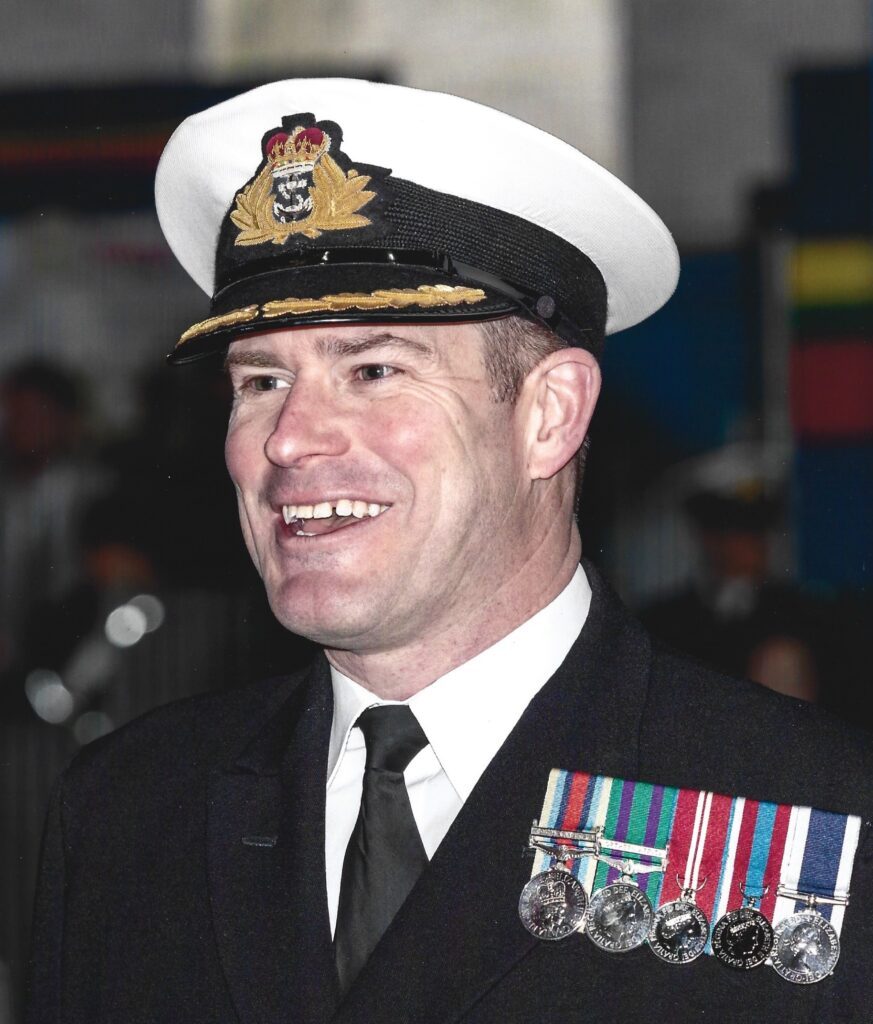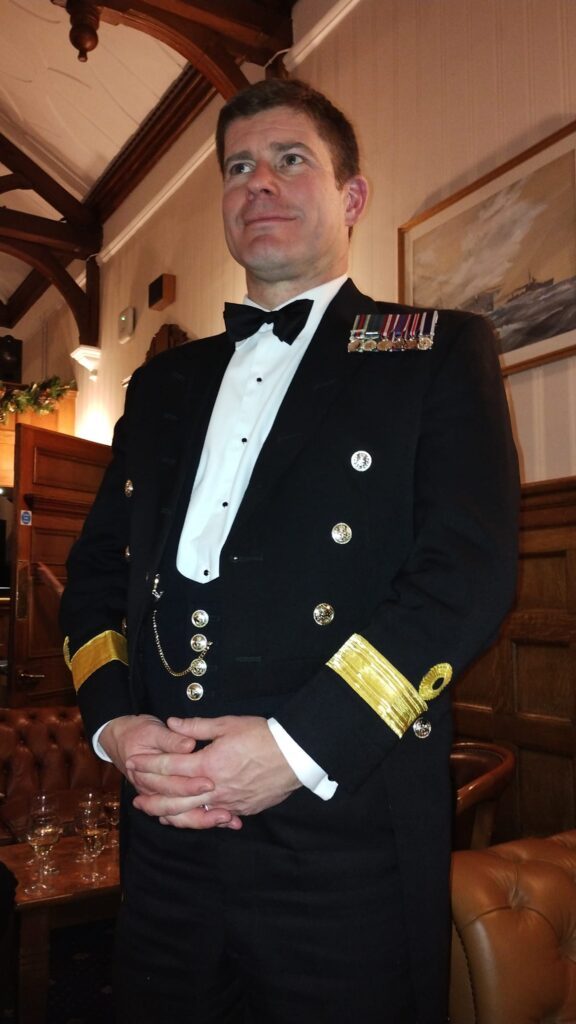
In our latest #HeForShe interview, we have the privilege of speaking with Steve Prest, a seasoned Royal Navy veteran transitioning into civilian life. With a 25-year illustrious career in the Royal Navy, Steve is now embarking on a new journey, focusing on consultancy and continuing his passionate advocacy for gender equality and inclusive leadership. His insights offer a unique perspective on the challenges and opportunities within the defence sector, particularly concerning gender diversity.
Tell us a bit about yourself, background, and your current role?
I’m currently resettling from the Royal Navy and preparing for the transition into civilian life. I don’t know quite what’s ahead of me yet, but I have started my own consultancy business and through this I intend to undertake a range of advisory, consulting and non-executive roles. As part of this I very much hope to continue my gender advocacy work and to be a champion of Inclusive Leadership.
My career in the Royal Navy has spanned 25 years and, when not engaged in daring-do on the High Seas, I have specialised in capability sponsorship and management, acquisition and major project delivery.

Did you ever sit down and plan your career?
I sketched out rough outlines of my career plan and had ideas about specific jobs that I wanted to do but my career rarely stuck to the plan! In general, I adopted a mindset of being micro-ambitious (an idea that I got from Tim Minchin; the comedian, musician and polymath). That is to say, I concentrated on doing the best job that I could wherever I was at that moment and looked for the opportunities that popped along the way. Sometimes, the things that I thought that I least wanted to do turned out to be the most fun and rewarding!
What one thing do you believe has been a major factor in you achieving success?
I think that it’s impossible to boil it down to one thing. Yes, you need to work hard and maintain excellence as a habit in all that you do; but you also need a large slice of luck and the support of family, friends and colleagues to help you on the way. Be curious and read widely; invest time and energy in building a big network; be generous in your support of others – pay it forward; and, when you most need support, others will rally around you and offer it willingly.
Have you faced any challenges along the way?
Plenty. I have found two things really helpful in navigating those moments when you feel that the whole world is bearing down on you: 1) master the “Stockdale* Paradox”: never lose faith that you will prevail in the end whilst, at the same time, be ruthless in dealing with the reality of your immediate circumstances; and 2) recognise that you only get one choice in life: what you do next. Focus on what you need to do next to work your way out of the difficult situation, and keep doing the next thing, and the next thing, and the next thing, etc…. until you have prevailed.
*Coined by US Navy officer James Stockdale, a fighter pilot and POW in Vietnam.
Do you believe the defence sector is where it needs to be in terms of gender equality and why?
No. It is much better than it was but there is still much work to do.

When and what made you realise there was an issue within the Navy in terms of gender equality?
For me, the salutary lesson came one day in HMS QUEEN ELIZABETH. I was in a small meeting which included two women who worked in my Department. We briefly touched on the subject of Gender pay equality (something that was in the news that day). “We’ve got this gender equality thing cracked” I said gleefully, “the Armed Forces pay equally for the same rank or rate and seniority irrespective of gender. We should be really proud that we’re a gender-blind meritocracy!” Cue a slightly awkward silence. “What?” I enquired, “tell me.”
The two women glanced at each other with a look that very clearly said “are you going to tell him, or am I?”
Whilst not specifically about the pay issue, there followed an object lesson for me in male privilege. Now, this is an inflammatory term. Those being “accused” of having privilege frequently rail against the fact on the basis that it somehow impugns their effort, hard work and achievements or perhaps, even, belittles their own struggles against adversity. I understand this as, I too, have the same instinctual reaction to the term but what it really means is relative advantage. And there’s no doubt that, listening to my female colleagues, I have had a relative advantage over them in my career simply by being a man. This takes many forms and most are small things, virtually imperceptible, but they add up and shape the landscape. Language is one of those things; not being invited to the pub when everyone else is going because “it’s probably not the sort of thing you’d enjoy” is another; people placing their hands on your hips as they move past you; and so on. A more modern example is perhaps not being added to the team WhatsApp group – or being added but finding that there is a shadow one with everyone but you where all the “banter” happens. All of these “micro aggressions” have an additive effect on people’s sense of belonging and confidence. And this is aside from the out and out bullying, sexual harassment, sexual assault, homophobia, transphobia and racism faced by members of our society. We could, should and must be better.
What steps can be taken to involve more men in the fight for gender diversity?
The crucial realisation for me was understanding that not everyone experiences the organisation in the same way that I do. And that matters. If we believe in fairness and meritocracy; in making our teams the most effective that they can be by realising the potential of every individual, then we need to understand this. The most important thing is to listen! We need to create the time, space and psychological safety for women, and other minority groups in our organisation, to share their stories. This doesn’t diminish our own stories but makes us all richer – it’s not a zero-sum game. Seeing the world through other’s eyes helps us to be better leaders and colleagues, addressing our blind spots and bringing out the best in all of those around us. Believe me, if you do this, there will be plenty of people advocating for you too!

How do you expect the workplace to change over the next five years to encourage more women into work?
I’d like to be optimistic. I think we will continue to become more understanding and accepting of diversity. We’ll increasingly make our workplaces somewhere a greater range of people feel that they belong and can bring the best of themselves. To be clear, this isn’t about challenging organisations’ purposes, values or standards of excellence but, rather, recognising that attracting, retaining and maximising the best talent available to us is essential for success.
Conclusion:
Steve Prest’s journey from the Royal Navy to advocating for gender diversity and inclusive leadership in civilian life underscores the critical need for ongoing dialogue and action towards gender equality in the defence sector. His reflections on the importance of listening, creating safe spaces for diverse voices, and the collective effort required to foster a truly inclusive environment are a call to action for all. As we look forward to the changes the next five years may bring, Steve’s optimism and commitment to diversity serve as a beacon for encouraging more women into work and ensuring that the workplace evolves to be more understanding, accepting, and supportive of all its members.
Join us in celebrating Steve’s contributions to the #HeForShe movement and his unwavering support for gender diversity. Stay tuned for more inspiring stories from leaders like Steve who are making a difference in the defence sector and beyond.





Responses